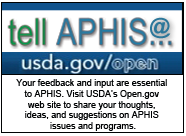Contact:
Lyndsay Cole (970) 494-7410
Lawrence Hawkins (916) 930-5509
Update from APHIS Regarding a Detection of Bovine Spongiform Encephalopathy (BSE) in the United States
On April 24, USDA's Animal and Plant Health Inspection Service (APHIS) confirmed the nation's 4th case of Bovine Spongiform Encephalopathy (BSE) in an animal that was sampled for the disease at a rendering facility in central California. This animal was never presented for slaughter for human consumption, so at no time presented a risk to the food supply, or to human health in the United States.
After USDA's National Veterinary Services Laboratories (NVSL) completed testing of the samples from the index animal, the samples were sent to The World Organization for Animal Health (OIE) reference laboratories in Canada and England. Both laboratories have confirmed that the index cow was positive for atypical (L-type) BSE.
Both dairies that were previously held under quarantine during the investigation have been released from those quarantines, after inventories were completed and records were reviewed.
In addition, investigation of the feed records at the index dairy premises has found no anomalies, and audits of all the feed suppliers to the index premises have shown them to be in compliance with the regulations.
APHIS previously announced that it has identified two progeny of the positive cow. One progeny born to the positive cow in the last 2 years was stillborn; the second animal was appraised, humanely euthanized, and sampled for BSE at the National Veterinary Services Laboratories in Ames, Iowa. Test results for that animal were negative for BSE.
Of several hundred potential birth cohort cattle, the focus of the tracing is on a small number (10-12) of cattle which may still be alive and have records that might allow them to be located. The remaining potential cohorts are no longer alive or have otherwise been ruled out.
As the investigation moves toward completion, local officials from the California Department of Food and Agriculture and USDA APHIS Veterinary Services are now in charge of the incident command.
The United States has a longstanding system of three interlocking safeguards against BSE that protects public and animal health in the United States, the most important of which is the removal of specified risk materials - or the parts of an animal that would contain BSE should an animal have the disease - from all animals presented for slaughter. The second safeguard is a strong feed ban that protects cattle from the disease. The third safeguard - which led to this detection - is our ongoing BSE surveillance program that allows USDA to detect the disease if it exists at very low levels in the U.S. cattle population.
#
Note to Reporters: USDA news releases, program announcements and media advisories are available on the Internet and through Really Simple Syndication (RSS) feeds. Go to the APHIS news release page at www.aphis.usda.gov/newsroom and click on the RSS feed link.
USDA is an equal opportunity provider, employer and lender. To file a complaint of discrimination, write: USDA, Director, Office of Civil Rights, 1400 Independence Ave., SW., Washington, DC 20250-9410 or call (800) 795-3272 (voice) or (202) 720-6382 (TDD).
